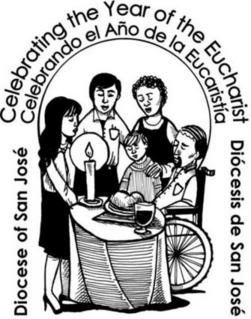 The Year of the Eucharist is an appropriate time to reexamine the relationship between the sacramental celebration of the Eucharist and eucharistic devotions. The Second Vatican Council formed us to understand that the Sunday liturgy is the source and summit of our faith. Everything we are about as Catholics must begin and end with the celebration of the Eucharist, especially the Sunday Mass. Pope John Paul II reminds us, “Among the many activities of a parish, none is as vital or as community-forming as the Sunday celebration of the Lord’s Day and his Eucharist” (Dies Domini, 35). It is no surprise, then, that the teaching of the Church regarding eucharistic devotions places the Sunday liturgy as the source and goal of all other forms of worship, including eucharistic devotions: “The celebration of the Eucharist is the center of the entire Christian life….‘The celebration of the Eucharist in the sacrifice of the Mass,’ moreover, ‘is truly the origin and the purpose of the worship that is shown to the Eucharist outside Mass.’ [Eucharisticum Mysterium, 3e]” (Eucharistiae Sacramentum, 1, 2).
The Year of the Eucharist is an appropriate time to reexamine the relationship between the sacramental celebration of the Eucharist and eucharistic devotions. The Second Vatican Council formed us to understand that the Sunday liturgy is the source and summit of our faith. Everything we are about as Catholics must begin and end with the celebration of the Eucharist, especially the Sunday Mass. Pope John Paul II reminds us, “Among the many activities of a parish, none is as vital or as community-forming as the Sunday celebration of the Lord’s Day and his Eucharist” (Dies Domini, 35). It is no surprise, then, that the teaching of the Church regarding eucharistic devotions places the Sunday liturgy as the source and goal of all other forms of worship, including eucharistic devotions: “The celebration of the Eucharist is the center of the entire Christian life….‘The celebration of the Eucharist in the sacrifice of the Mass,’ moreover, ‘is truly the origin and the purpose of the worship that is shown to the Eucharist outside Mass.’ [Eucharisticum Mysterium, 3e]” (Eucharistiae Sacramentum, 1, 2).In other words, the Mass must be the first and central place of our devotion. This seems clear. However, we tend to think of “devotion” as quiet, personal reflection. This is, indeed, what we mean when we speak of private devotion such as praying before the tabernacle. But to show true devotion in the liturgy, especially the Eucharist, the fathers of the Second Vatican Council tell us, “Mother Church earnestly desires that all the faithful should be led to that fully conscious and active participation in liturgical celebrations which is demanded by the very nature of the liturgy” (Constitution on the Sacred Liturgy, 14).
Given the teaching of the Church, communities that wish to increase the devotion to the Eucharist among the faithful would attend first of all to the elements of the Sunday liturgy that foster full, conscious, and active participation. Some of these include: beautiful music and enthusiastic singing, clear and powerful proclamation of the Word, preaching that is intimately connected to the lives of the faithful, full and sensual symbols, sharing fully in Communion (both Christ’s Body and Blood), and shared, common posture throughout the liturgy, particularly during the Communion rite.
The devotion we show to the Eucharist through our full, conscious, and active participation in the Mass strengthens and sends us to practice devotion to the Eucharist on a daily basis. The primary way we do this is by living out the final words of the Mass: “Go to love and serve the Lord.” Thus our love for Christ in the Mass will be authentic if we show that love for Christ outside of Mass as well. We show love for Christ when we love those whom Christ loved—the poor and the outcast. In this way will all creation be united in Christ in true communion.
Worship of the Eucharist outside of Mass then helps us to strengthen our love for Christ. It makes us hunger for Communion—not simply the consecrated bread and wine, but the common union of all people joined in Christ. Thus it is a tradition that is warmly encouraged by the Church. The Second Vatican Council said, “Popular devotions of the Christian people are to be highly commended, provided they accord with the laws and norms of the Church, above all when they are ordered by the Apostolic See” (Constitution on the Sacred Liturgy, 13). There are many forms this may take, but there are three that most Catholics practice or are familiar with. These are: 1) simple adoration, 2) exposition of the Blessed Sacrament with Benediction, and 3) perpetual exposition.
Each of these forms of adoration is focused on the reserved sacrament that is consecrated at Mass, and all forms of eucharistic adoration recognize that “[t]he primary and original reason for reservation of the Eucharist outside Mass is the administration of viaticum [Communion for the dying]” (Eucharistiae Sacramentum, 5). Therefore, our prayer before the Blessed Sacrament is not so much an inward act as it is a call to focus on others—the poor, the weak, and the dying who are nearing the fulfillment of their communion with Christ. Furthermore, our adoration of the Lord present in the sacrament increases our hunger to do the mission of the Eucharist: “the spread of the Gospel and the imbuing of society with Christian values” (Mane Nobiscum Domine, 24).
FILED UNDER: LITURGY